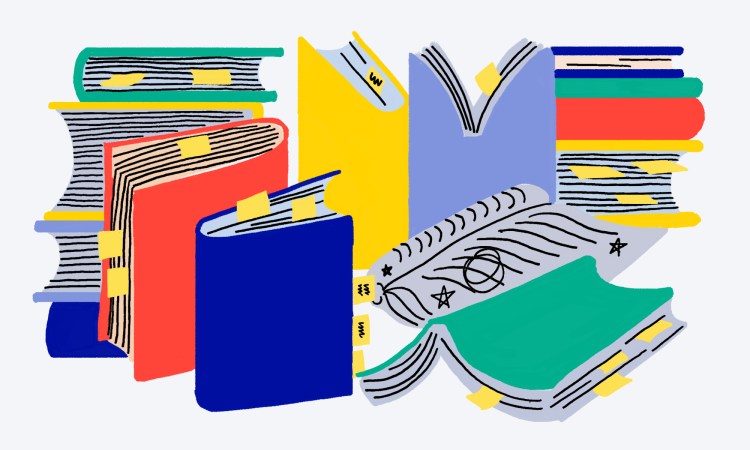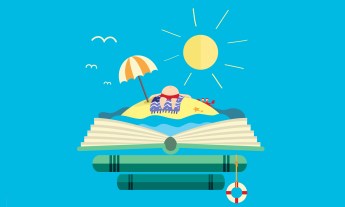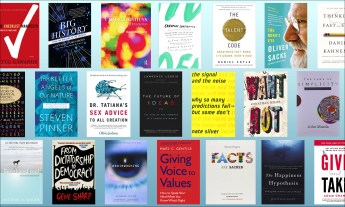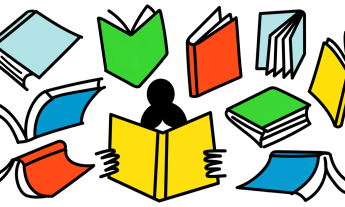
From tech to self-help via poetry, fiction and graphic novels, here are the books you need to read.
What’s the one book you’re always thrilled to discover that someone else has read? We posed that question to TED speakers — and, well, they geeked out, offering us a list of hidden gems that wouldn’t typically crop up on a holiday shopping list. Read on …
Literature
A Tale for the Time Being by Ruth Ozeki
“This is a wonderfully written novel about empathy, nature, mortality, zen and quantum mechanics. A good reminder of how we are all connected and all trying to find our place ‘for the time being.’”
— Recommended by Benedetta Berti
Foundation by Isaac Asimov
“Asimov was a masterful fringe thinker, and this first book in the Foundation series shows just how attuned he was to possible and plausible future scenarios. Although it’s 50 years old, Foundation is especially provocative reading given our current state of world affairs — in order to save humankind and the vast knowledge we have accumulated, the main character gathers the smartest thinkers and forms a secret society. But that doesn’t go exactly as planned, either.”
— Recommended by Amy Webb
Fugitive Pieces: A Novel by Anne Michaels
“Anne Michaels’s poetic collage about love and loss and escaping the wounds of Europe to construct a fresh future in the New World remains one of the novels I’m always thrilled to recommend to friends — in part because I’m fairly sure they’re about to recommend it to me. It’s moving and beautiful and ageless, and nothing quite like it has ever been written.”
— Recommended by Pico Iyer
The Forsyte Saga by John Galsworthy
“This is cheating, because it’s a series of novels! Like so many great novels of the 19th and early 20th centuries, very little actually happens, but the characters and their world are painted so well, and so truthfully, that every page becomes a thing of almost unbearable beauty.”
— Recommended by Simon Anholt
All the Light We Cannot See by Anthony Doerr
“This is one of those books where you feel like you have fallen deeply into someone else’s dream. It’s an epic World War II story, but it’s the tenderness on every page that is haunting.”
— Recommended by Rachel Botsman
Jane Eyre by Charlotte Brontë
“I read this when I was eight. And I’ve read it a few times since, and watched it onscreen too. Nothing dulls it or stops me loving small, plain Jane, a Yorkshire lass like me, who had more spirit and fire in her 150 years ago than I probably do today, with all my modern freedoms and privilege. I love the story because it is a tale of a woman becoming free, while still being a classic love story. I mean, there’s even a madwoman in the attic. But I love Jane because I love Charlotte too: a woman who triumphed in a deeply patriarchal world, getting published and getting famous, while living in a cold, glum vicarage on the edge of the moors. Emily Brontë’s Wuthering Heights is seen as a trickier, better book by many, because they are fooled by the romance of Jane Eyre. Look behind that, and you find a character as complex and wonderful as any Cathy or Heathcliff, in little, plain Jane, who would always ‘rather be happy than dignified.’”
— Recommended by Rose George
The Vegetarian: A Novel by Han Kang
“This is the first full-length novel by South Korean literary star Han Kang to be made available in English. It tells the story of a woman who suddenly stops eating meat, a shock decision that fractures her family relationships, allowing glimpses of the traumas, assumptions and impossible dreams that lie beneath. The writing is stunning: poetic, alluring, troubling and strange. And the drama keeps you turning the pages to the end. Fabulous.”
— Recommended by Ann Morgan
Everything I Don’t Remember by Jonas Hassen Khemiri
“I could have mentioned all sorts of smart journalistic literature on my main topics of digitalization and democracy, but as a reporter, I have a strong and constant need to refuel with the stories and the language of artists. Khemiri just won Augustpriset, one of the finest Swedish literary awards, and rightfully so. This novel is a state-of-the-art literary composition, made with heart and mind and craftsmanship at the highest level. When it is released in English during 2016, I expect Jonas Hassen Khemiri to conquer the world.”
— Recommended by Andreas Ekström
The Neapolitan Novels by Elena Ferrante
“These four novels tell the story of two friends, Lila and Elena, as they grow up in a poor Neapolitan neighborhood, escape and return. These books are brilliant, utterly compelling in their dissection of friendship and family — storytelling at its most powerful.”
— Recommended by Hilary Cottam
Remainder by Tom McCarthy
“I love this book because it’s about a man who has a traumatic head injury and decides to spend all his settlement money re-enacting memories he’s never had. If you like books about obsessive people, repetition and old ladies cooking copious amounts of liver, this book is for you.”
Recommended by Gabriel Barcia-Colombo
Skyfaring: A Journey with a Pilot by Mark Vanhoenacker
“I’ve run the gamut on my personal flying experiences. Used to love flying, then really didn’t like it, then was afraid of it, and now I enjoy it again. Skyfaring is a poetic and beautiful tome on the wonders of flying and the experiences of sailing through the air from one place to another. The author, a current 747 pilot, has such an effortless way with words. I’ve highlighted more great lines in this book than any other in the past few years. If you love how words can connect ideas, feelings and your imagination, you’ll love this book.”
— Recommended by Jason Fried
What Is the What by Dave Eggers
“An epic odyssey of a young ‘lost boy’ from Sudan, Valentino Achak Deng, who, along with tens of thousands of other children, escapes a brutal civil war and faces attackers, wild animals, hunger and thirst along his trek. He ends up in sprawling refugee camps in Ethiopia and Kenya and is finally resettled to the U.S., where opportunity awaits him but also a series of shocking setbacks. But nothing dampens his spirit and wisdom, and the reader turns page after page, hoping he makes it unscathed, and emerges with a profound understanding of the driving will for survival, the resilience of the human spirit and the transformative power of helping refugees.”
— Recommended by Melissa Fleming
Silence by Shusaku Endo
“Set in 17th-century Japan, this stark, impeccably structured novel revolves around a haunting question: How can God remain silent in the face of human suffering? Endo’s work traces the journey of Sebastian Rodrigues, a Portuguese Jesuit sent to minister to local Christians under violent state persecution — and to investigate reports of another priest’s apostasy. This deeply ambiguous work refuses to provide any easy answers to its central inquiry — it just raises another that readers, regardless of belief, will grapple with long after: How much are we willing to suffer to end the suffering of others?”
— Recommended by Noy Thrupkaew
Akata Witch by Nnedi Okorafor
“I love fantasy and science fiction, but people of color are sorely underrepresented across the speculative fiction universe. This young adult coming-of-age story’s main character struggles with her bi-cultural identity, which resonates with me. (She also struggles with understanding her magical powers, which I can also relate to.) I read this book to my daughter, and we both couldn’t wait to get to it every night.”
— Recommended by Mia Birdsong
Jimmy Bluefeather by Kim Heacox
“This brilliant first novel contains hundreds of sentences that read like sheer poetry. The writing is incredibly beautiful. Almost every paragraph gifts us some stunning turn of phrase that made me stop and savor not only the words but also the wisdom. The characters seem like people we’ve known; they ring true, and feel vivid. The biggest illusion of the book is its seeming effortlessness, like something that had merely waited to be born whole. It’s a tremendous achievement.”
— Recommended by Carl Safina
Tech
Where Wizards Stay Up Late by Katie Hafner
“It’s the remarkable and rarely told story of the people who created the internet. For all its ubiquity and importance in the modern world, we tend to forget that the internet was the result of imagination, hard work and remarkable feats of engineering from a relatively small group of brilliant people. One day the people behind the first networked computing in the late 1960s and early 1970s might be held in the same regard as Fleming, Faraday or Edison. Where Wizards Stay Up Late tells their story in meticulous (and occasionally quite funny — such as the very first word ever transmitted online, which was ‘lo’ before the system crashed) detail. Anyone who is interested in where the internet came from, and why it was designed like it was — which really should be all of us — must read this book.”
Recommended by Jamie Bartlett
The Most Human Human: What Artificial Intelligence Teaches Us About Being Alive by Brian Christian
“A delightful and insightful exploration of what we mean by human intelligence. Christian memorably uses the metaphor of thinking ‘in the book,’ drawn from chess, to illuminate not only chess (Deep Blue didn’t really beat Garry Kasparov) but also a whole range of human experiences, like how one might end up in a threesome in a bathtub with no idea what to do next, or how to be fully present in a conversation with a stranger.”
— Recommended by Rebecca Saxe
Data-ism by Steve Lohr
“There’s so much hype out there about ‘big data,’ and in my work at Wired and now at Iodine I’ve been responsible for some share of it. Lohr’s book thankfully discerns the real power — and limitations — of data-driven decisions. He finds the humanity in the subject, and makes a strong case that data is only going to be an ever-more powerful force in business and society, for good and ill.”
— Recommended by Thomas Goetz
Science
Brilliant Green: The Surprising History and Science of Plant Intelligence by Stefano Mancuso
“Some books just change the way you look at the world. This book that asks, ‘are plants intelligent?’ is one of them.”
— Recommended by Sugata Mitra
How We Got to Now: Six Innovations That Made the Modern World by Steven Johnson
“This book really showed me the amazing pathways that led to innovations that make our lives work today. The stories are told almost like a dramatic mystery to make the history come to life with excitement and aha moments.”
— Recommended by Bill Gross
Leaving Orbit: Notes from the Last Days of American Spaceflight by Margaret Lazarus Dean
“I love how Lazarus Dean notices unexpected details and tells her story in unexpected ways. Books about space are rarely this human.”
— Recommended by Andrew Blum
Lives in Ruins: Archaeologists and the Seductive Lure of Human Rubble by Marilyn Johnson
“Johnson is an absolutely delightful writer. She follows the story of archaeologists working in different parts of the world and asks: What would drive people to do this? What guides people to travel to godforsaken places all over the world and spend all this time preparing to go into the field when the risk is so great and the payoff is often not much. All of us are driven by our passion. She does a beautiful job of explaining why we do what we do.”
— Recommended by Sarah Parcak
The Survival of the Sickest by Sharon Moalem
“I always get excited when I talk to someone who has read this book because it explores human bodies and medicine in an entirely new way. It raises important questions and evolutionarily rooted solutions that are full of entertaining and shocking anecdotes.”
— Recommended by Chelsea Shields
Against Method by Paul Feyerabend
“I love this book very much because it helped me reconsider how I think, how knowledge is produced, organized, what is science, what is belief and how the logic of play and chaos can be fertile grounds to a healthy living culture.”
— Recommended by Cesar Harada
Crystal Giants by Giovanni Badino
“This book shows clearly how the reality of nature can go far beyond human imagination. Badino and the explorers of La Venta bring the reader on the exploration of one of the most astonishing places of the world, the Giant Crystal Cave of Naica, discovered in a silver mine in Chihuahua, Mexico, in 2000. This underground cave hosts the biggest crystals found on Earth, up to 11-meter-long transparent prisms of selenite.”
— Recommended by Francesco Sauro
The Beginning of Infinity by David Deutsch
“It is rare that one picks up a book that has so many radical new ideas and changes one’s view of how the universe works. Not easy, not always fun, but provokes serious thought.”
— Recommended by Juan Enriquez
Business and Politics
This Changes Everything: Capitalism vs. the Climate by Naomi Klein
“Naomi Klein’s impressive scholarly work about climate change and our lamentable record of responding to it lays bare exactly why our predicament has become as dire as it has: Why, in summit after summit, the nations of the world can’t put teeth in any of the commitments they manage to establish; why, after decades of ominous warnings, CO2 emissions have gone up instead of down. The root cause lies with the growth- and exploitation-obsessed economic system that has ruled our life and emasculated the democratic process. Did you know, for example, that international free-trade agreements contain provisions that allow a private company to sue a government whose attempts to establish climate-protection legislation infringe on the company’s profits? Put another way, solutions to the climate crisis have effectively become illegal. Imagine that!”
— Recommended by Carolyn Porco
Re-inventing Organizations by Frederic Laloux
“This book is about the rise of self-management as a new and future form of organization. Laloux shows how a number of extraordinary organizations, from nursing to power generation, have reinvented their management practices simply based on a different perspective of how we could relate to one another. Their workers have flourished and their market share has grown. I love this book because it is at once practical and inspiring.”
— Recommended by Hilary Cottam
Getting to Maybe: How the World Is Changed by Frances Westley
“Westley was my instructor in a conflict resolution course many years ago, and I have read this book multiple times. I learn something new each time. However, the main message I got from it when I read it the first time was that when trying to change the world (in whatever field you work with), it’s important to stop every once in a while and really think about what you are doing. It is OK to change plans, it is OK to change strategies, it is OK to revamp. Sometimes we are so deeply involved with what we do and the methods we use to reach our goals that we do not even see when it is not working.“
— Recommended by Patricia Medici
Exodus: How Migration Is Changing Our World by Paul Collier
“This fall in Sweden, this was a must-to-read book. From his position as a truly independent thinker, Collier analyzes migration from the perspectives of all involved: receiving country, the migrant and the nation left behind. He provides no policy blueprint, but makes everyone think in new ways.”
— Recommended by Hans Rosling
Graphic Novels and Picture Books
Trashed by Derf Backderf
“I spotted this graphic novel on a shelf at my favorite indie bookstore and it blew me away. A fascinating and gritty autobiographical account of working on a sanitation truck in a small town, it overflows with great characters and moments (including a few memorable ones involving maggot-infested trash cans). It’s the perfect gift.”
— Recommended by Dave Isay
Batman: Year One by Frank Miller and David Mazzucchelli
“It’s a great novel about urban crime that just happens to have Batman in it.”
— Recommended by Chip Kidd
Wangari’s Trees of Peace by Jeanette Winter
“This is one of my daughter’s favorite books. I like it too because it is never too early to teach children about protecting the environment, social activism and standing up for what is right.”
— Recommended by Benedetta Berti
Justice
Guantanamo Diary by Mohamedou Ould Slahi, edited by Larry Seims
“A heartbreaking and humorous memoir of a still-detained inmate from Guantanamo Bay. Learning English from the guards and interrogators who kept him company, he began to put pen to paper about his experience in the controversial prison. The papers would consistently get confiscated. After seven years, his legal team was able to secure the release of 400+ pages that Slahi had written. The book is masterfully compiled by Larry Seims. Never in my life have I read an account so alive, so full of compassion. This book is mandatory reading for all Americans.”
— Recommended by Bassam Tariq
Writing My Wrongs: Life, Death and Redemption in an American Prison by Shaka Senghor
“After a few pages, I knew this book was going to alter my perception on incarceration in America, as we need to hear first-hand stories straight from people who were systematically put there rather than through Hollywood movies or researchers or journalists. Throughout the whole book, I was like, ‘This is happening right in my backyard?’ Shaka spent 19 years transferring from one prison to another and experiencing each one’s subculture and unwritten rules. His words are honest and very necessary, and I hope they will help humanize incarceration policies. Or, better, to use education and mentorship to find a way to prevent young kids from being incarcerated. Their bodies do not belong to any system or country but themselves, and it is our responsibility to listen.”
— Recommended by Christine Sun Kim
Unjust Deeds: The Restrictive Covenant Cases and the Making of the Civil Rights Movement by Jeffrey D. Gonda
“This book tells the story of six African-American families who won a landmark Supreme Court case attacking housing discrimination in the years after World War II. I love it because of the richness of the writing, the timeliness and importance of the topic, but most of all because of the people whose stories it tells. It’s a reminder of the extraordinary power that individuals can have when they decide to take a stand for justice.”
— Recommended by Jedidah Isler
My Bondage and My Freedom by Frederick Douglass
“‘No man can put a chain about the ankle of his fellow man without at last finding the other end fastened about his own neck.’ To me, this quote perfectly illustrates the effect that slavery had on those who were raised to uphold its tenets. That a system can be a detriment even to those that may benefit from it I find incredibly poignant even in today’s society. It’s so important that we recognize the implications of our beliefs both in how they affect ourselves as well as others. My Bondage and My Freedom not only taught me about the cruel reality of slavery but also showed that in the most depraved systems humanity will seek to reach its potential no matter what obstacles are placed in its path.”
— Recommended by Zak Ebrahim
Just Mercy: A Story of Justice and Redemption by Bryan Stevenson
“This book showed that you can tell the stories of the roughest, the most searing, the most inhumane parts of our world, and leave your audience feeling more human and more hopeful than before.”
— Recommended by Jake Barton
Arts and Architecture
Building Art: The Life and Work of Frank Gehry by Paul Goldberger
“This book just came out and it is really stunning. Whether you like Gehry’s work or hate it, it is a fascinating deep dive into how someone becomes an international phenomenon and spawns a global re-evaluation of architecture (the Bilbao effect). Bonus is that it deals with some of my favorite issues: Jewish guilt, family disfunction, self-deprecation and wearing head-to-toe black.”
— Recommended by Marc Kushner
Art as Experience by John Dewey
“I love that he pulls the aesthetic out of the rarified and into the everyday. He makes the point of art as absolutely accessible and essential.”
— Recommended by BJ Miller
The Singing Neanderthals: The Origins of Music, Language, Mind and Body by Steven Mithen
“This is a brilliant read for anyone who is passionately connected to music. Mithen brings together psychology, evolutionary biology, neuroscience, archaeology and more to uncover just how deeply music is embedded in our species. Immensely readable, quirky and full of insight into our human condition, this book drops my jaw at least once per chapter.”
— Recommended by Meklit Hadero
Biographies and Memoirs
The Glass Castle: A Memoir by Jeannette Walls
“The writing is so fluid, so effortlessly compelling. The story is of a young girl with great determination, resilience and drive. I find it both beautiful and inspiring, both as a writer and as a human being.”
— Recommended by Daniel Levitin
Romantic Outlaws: The Extraordinary Lives of Mary Wollstonecraft and Her Daughter Mary Shelley by Charlotte Gordon
“Wollstonecraft and Shelley are two of the most important women most people have rarely thought about. They believed passionately (and at great cost) in the equality of women and the vital, distinctive contribution women should be able to make to human history. Their stories alone are remarkable, but Charlotte Gordon’s idea to interweave the two biographies brilliantly explores the deep relationship between the mother and the daughter who never knew each other. In their search for a richer and more liberated way of life, the Romantics cherished Wollstonecraft’s writing and the daughter they hoped would embody the life of imaginative emancipation. What a legacy — but what an inspiration.”
Recommended by Margaret Heffernan
Barbarian Days: A Surfing Life by William Finnegan
“Sometimes I just want to read a book that makes me want to quit my job and travel the world to look for adventures. This is that kind of book. Framed in his lifelong addiction to surfing, Finnegan writes raw and beautifully about growing up as a haole in Hawaii, coming of age and exploring the world in search of waves and purpose, and later the complex question of balancing family, work and hours spent doing what you love the most. He is also one of the very few writers around who is able to explain the often absurd dedication and driving addiction surfers have for breaking waves, without getting tangled up in clichés and at the same time making it understandable for a wider audience.”
— Recommended by Anders Fjellberg
Modern Families: Stories of Extraordinary Journeys to Kinship by Joshua Gamson
“Gamson presents an illuminating study of many of the ways family has evolved in recent decades. He weaves the whole thing together with beautiful, personal stories of people creating family and kinship. This book is a powerful reminder that love — not structure or biology — is what makes a family.”
— Recommended by Mia Birdsong
Self-Help
Big Magic: Creative Living Beyond Fear by Elizabeth Gilbert
“Forget what you think about Eat, Pray, Love. Gilbert has a phenomenal lens on how creativity really works. Throughout the book, she reminds you that if you take creativity off a precious pedestal and just keep working on something, magic does happen.”
— Recommended by Rachel Botsman
Willpower: Why Self-Control Is the Secret to Success by Roy F. Baumeister and John Tierney
“I love this book because it explained so many things to me … about me. Willpower is, quite clearly, a primary tool for success in work and love. And this book is packed with gripping stories about those who have struggled with temptation (from Oprah and Eric Clapton to Henry Morton Stanley and more) that vividly illustrate how to engage this precious fuel, willpower, to win in business and romance. And I finally know why, after days of being soooo good, I get to an airport and go wild on sweets. This book reaches deep into those most fascinating topics: human nature; how the brain and body work; why we do the things we do; and how to battle our darker angels to succeed in life.”
— Recommended by Helen Fisher
Mindset: The New Psychology of Success by Carol Dweck
“Dweck’s treatise on growth versus fixed mindsets has been extraordinarily influential in my professional and personal life. One of the greatest things that holds us back from reaching our full potential is fear of failure. By believing that we can grow and change our abilities through hard work and grit, we can get past that fear and unlock all sorts of possibilities in ourselves.”
— Recommended by Margaret Gould Stewart
What to Do When It’s Your Turn by Seth Godin
“This is the most TED-inspired book I’ve ever written. And it’s also the one that keeps growing in popularity, with people buying dozens of copies to share (that never happens). I love it because it’s about you and what you’re going to do next.”
— Recommended by Seth Godin
After Virtue: A Study in Moral Theory by Alasdair MacIntyre
Spheres of Justice: A Defense of Pluralism and Equality by Michael Walzer
“I’d offer two books. They are masterful works of moral philosophy that have changed the way I think about justice, work and virtue. MacIntyre is not an easy read, but these two books changed my life.”
— Recommended by Barry Schwartz
The Art of Asking by Amanda Palmer
“This book changed me. It made me think, sob and reevaluate how I interact with the people in my life. It is a unique blend of memoir, self-help and cultural commentary. The central message of the book (that asking for help is not a burden, but a gift) is masterfully interwoven throughout Amanda’s story of her evolution as artist, wife and friend. I have never been so taken by a book.”
— Recommended by Emilie Wapnick
Poetry
The Essential Rumi by Jalal al-Din Rumi, translation by Coleman Barks
“It’s a book of poetry by a 13th-century Sufi poet who talks in most honest and transparent ways of all human emotions. The poems never failed to bring perspective in my daily life. And it always creates an immediate connection when I meet someone who has read it.”
— Recommended by Zainab Salbi














